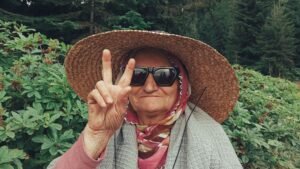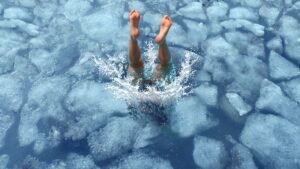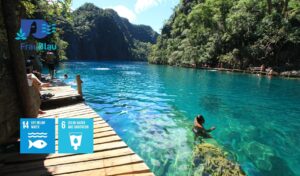It seems that cold water dipping has only Pro’s and no Con’s – you socialize, push your own limits, have fun time together and get healthy at the same time. It’s no wonder that the concept has found so many followers.
While cold water dipping is most strongly associated with the Nordics, its appeal has spread globally, with people in various parts of the world adopting the practice for its documented health benefits and the unique experience it offers. However, its deep cultural roots and historical significance remain strongest in countries like Finland, Sweden, Norway, Denmark, and Iceland.
Nordic people have long embraced the cold as part of their natural environment. Historical records and folklore indicate that Vikings and other early Nordic peoples would often immerse themselves in cold water, to promote health and vitality.
The practice of ice-cold dipping is also closely tied to the tradition of sauna bathing, which usually includes a ritual of alternating between hot and cold. This contrast between hot and cold is also believed to have numerous health benefits.
Health Benefits of “cold water immersion”, the official term for the application, have been scientifically confirmed from various corners and about different methods in Europe. Cold water dipping has a positive effect on improved circulation, reduced inflammation, and is a boost to the immune system.
It is also known to strongly increase stress resilience – both mental as physical stress. The growing interest in natural health remedies these days rediscovers and establishes once more traditional methods.
A conversation with Halla Nolsøe Poulsen, Director of NORA, convinced cold-water dipper and part of a group of women from Iceland who regularly meet to dip together and who come to the Faroe Islands together to explore the “scene” there. I randomly met with Halla and the group in Sandoy, when they intended to dip on a cold and foggy day – that is how I knew about Halla’s and the group’s passion.

The cold-water dipping topic is new for the Faroese – the ocean has so far been seen mainly as the source of local income, fishing and seafaring. The idea of jumping into the (cold) water would not have occurred to most residents. It is only in recent years that interest in this – at first glance uncomfortable – sport and the corresponding offers have developed. It also plays a role in better accepting the local climatic conditions as part of one’s own identity.
The pandemic might have had her share in this development – as Halla explains her own engagement:
“I moved to Iceland in 2020, in the middle of the pandemic, to be the Representative of the Faroe Islands in Iceland. Whereas the children could continue to go to school, I was stuck in home office, could not take meetings, could not arrange events – all the things I came here to do. It was permitted however to do activities together outdoors, so I came upon this ad to join a dipping course. I had seen beaches with huge hot tubs before, which were never populated when I came by, so I knew there was something going on and I was curious. This is how my journey started.
I joined the group and since then we are close-knit friends, exploring the knowledge and experiences possible around cold water dipping.
Has it improved my health? It absolutely has. I am tracking my walks and exercises etc. with an app or with the apple watch (can’t really track the dipping, as there is not so much movement involved) and realised that my rate of cardiovascular fitness increased considerably during the winter months, the colder the water, the better it got – the temperature obviously has a real impact on my oxygen intake.
Increased Stress Resilience? Definitely – when you dip in cold water, you must zoom into yourself and overcome the wish to stay in your comfort zone. There is no space for other worries or challenges. It has become my magic to calm the spirit.”
Meanwhile, the trend is gaining momentum in the Faroe Islands – with hot tubs, changing rooms and even a floating sauna popping up in different places for the increasing community of fans. In the Faroe Islands, health recreation involving the ocean and cold water now is an appreciated pastime and has a nice social element too.
We will show more interesting and positive aspects of cold water in the Faroe Islands – also in connection and as an experience for incentive or conference groups.
If you organise conferences/events in a context of medical, research, energy, tunneling, water/ocean, sports or art, it will be a good idea to bring them to the Faroe Islands. The meeting ambassadors and Visit Faroe Islands Meetings will be happy to support.
Subscribe to Visit Faroe Islands Meetings Newsletter!
Come and visit the Faroe Islands with your conference and make sure to contribute to environment or society through knowledge and purposeful events, using the SDGs as orientation. We are happy to help you design your conference legacy – e g by organising visits and meetings with innovators!

More stories and talks with influential and innovative people from the Faroe Islands, case studies and updates you find on the LinkedIn Showcase of Visit Faroe Islands Meetings:
https://www.linkedin.com/showcase/visitfaroeislandsmeetings
More general information about the Faroe Islands can be found by visiting the Visit Faroe Islands Meetings website.
content design/editing:
By Johanna Fischer/FrauBlau for Visit Faroe Islands Meetings July 31, 2024





